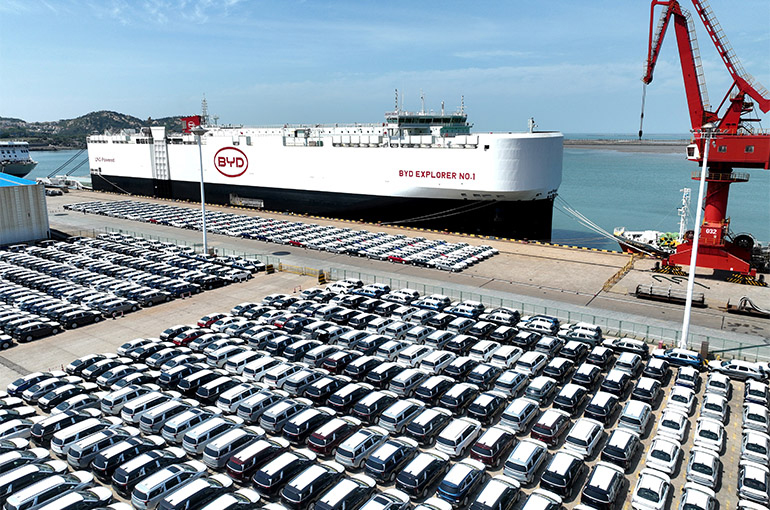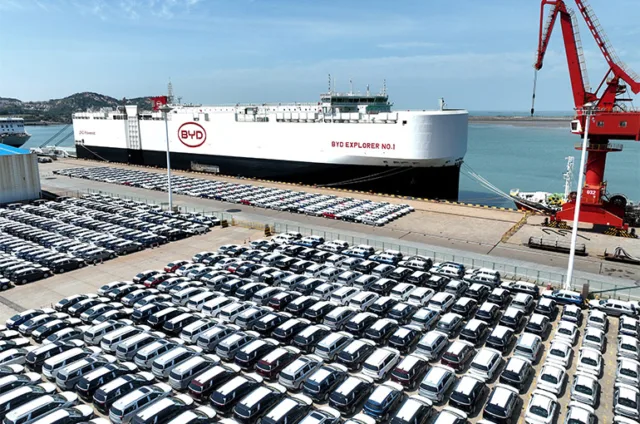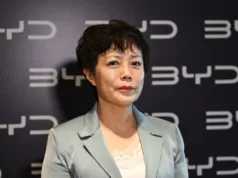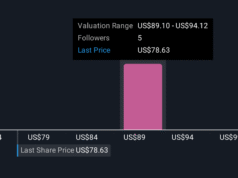
(Yicai) Nov. 20 — Geely Automobile Holdings and BYD are both aiming for more than 50 percent growth in international sales in 2026, as the Chinese automobile giants accelerate their push into global markets.
Geely expects its overseas sales to soar by between 50 percent and 80 percent next year to around 600,000 vehicles, the Hangzhou-based firm said during its third-quarter earnings call on Nov. 17.
Meanwhile, BYD is targeting international sales of1.5 million autos in 2026, according to a report by US lender Citibank, citing the Shenzhen-based firm’s management team. This represents a more than 50 percent surge, according to Yicai calculations.
Geely plans to expand across five major regions, namely Europe, Eastern Europe, the Association of Southeast Asian Nations, Latin America and Africa, the Association of Southeast Asian Nations and the Middle East, it said. The firm’s overseas dealer network will increase from more than 890 outlets to between 1,100 and 1,200 outlets. New energy vehicles are expected to account for between 45 percent and 50 percent of sales.
BYD’s European sales network will reach 1,000 outlets by the end of this year and is expected to double next year, Maria Grazia Davino, general manager of BYD in Europe, said at a recent event in Frankfurt.
Chinese automakers are keen to go global not only because of the large market space, but also because the profit per vehicle is higher, analysts said. BYD’s profit per auto is over CNY20,000 (USD2,812) abroad, more than that in China, the firm said at an investor conference call.
Improvements in the core technologies of China’s self-developed fuel vehicles and advantages in the new energy industrial chain are helping leading Chinese automakers to expand overseas and pursue a second growth curve, according to a recent report by financial services firm China International Capital Corp.
As a result, a number of other Chinese EV makers have also set their sights on international markets. Zhejiang Leapmotor Technology aims to sell between 100,000 units and 150,000 units overseas next year, the Hangzhou-based company said in its third-quarter report released on Nov. 17.
Xpeng Motors plans to launch at least three new models abroad next year and start making cars in Indonesia and Austria, He Xiaopeng, the automaker’s chairman and chief executive officer, said at the Guangzhou-based company’s earnings call on Nov. 11. Xpeng’s deliveries soared 125 percent in the first three quarters from a year ago to 28,000 vehicles.
Mainstream vehicle manufacturers such as Chery Holding Group and SAIC Motor are also ramping up their overseas investment. Chery’s exports are expected to exceed one million vehicles this year, while SAIC sold 765,000 units in international markets in the first three quarters.
China’s auto exports are expected to top six million units this year, and overseas sales by Chinese carmakers are likely to grow by between 5 percent and 10 percent next year, CICC said.
In the first three quarters, China’s NEV exports surged 84 percent year on year to 1.66 million autos, and the share of electric car exports soared to 40 percent from 25 percent last year. NEVs are likely to account for half of all vehicle exports next year, CICC said.
Editor: Kim Taylor









